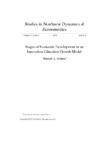Mostrar o rexistro simple do ítem
Stages of Economic Development in an Innovation-Education Growth Model
| dc.contributor.author | Gómez, Manuel A. | |
| dc.date.accessioned | 2022-03-16T13:02:00Z | |
| dc.date.available | 2022-03-16T13:02:00Z | |
| dc.date.issued | 2011 | |
| dc.identifier.citation | Gómez, M.A. (2011). Stages of Economic Development in an Innovation-Education Growth Model. Studies in Nonlinear Dynamics & Econometrics, 15 (4). https://doi.org/10.2202/1558-3708.1857 | es_ES |
| dc.identifier.issn | 1558-3708 | |
| dc.identifier.uri | http://hdl.handle.net/2183/30026 | |
| dc.description.abstract | [Abstract]: Physical capital accumulation, knowledge formation and R&D-based technological progress are considered the three main sources of growth. The common view is that they characterize, in a temporal order, the three phases that a typical advanced economy passes through in its development process. Recently it has been argued, however, that an innovation-education sequence could agree better than an education-innovation transition with the empirical fact that the rise in formal education to the masses follows rather than precedes the process of industrialization. Accordingly, this paper devises an endogenous growth model with physical capital, human capital and R&D that, unlike previous related work, is able to generate adjustment dynamics in which the innovative stage precedes knowledge formation, consistent with empirical evidence. | es_ES |
| dc.language.iso | eng | es_ES |
| dc.publisher | De Gruyter | es_ES |
| dc.relation.uri | https://doi.org/10.2202/1558-3708.1857 | es_ES |
| dc.title | Stages of Economic Development in an Innovation-Education Growth Model | es_ES |
| dc.type | info:eu-repo/semantics/article | es_ES |
| dc.rights.access | info:eu-repo/semantics/openAccess | es_ES |
| UDC.journalTitle | Studies in Nonlinear Dynamics & Econometrics | es_ES |
| UDC.volume | 15 | es_ES |
| UDC.issue | 4 | es_ES |
Ficheiros no ítem
Este ítem aparece na(s) seguinte(s) colección(s)
-
II - Artigos [572]






